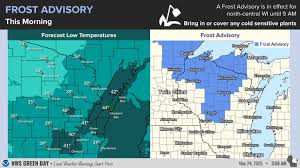
The Importance of Frost Advisories
Frost advisories are critical weather warnings issued by meteorological agencies to alert the public about the possibility of frost conditions that can harm agriculture, gardens, and sensitive outdoor plants. With increasingly unpredictable weather patterns, understanding such advisories has become vital, especially as colder months approach. Farmers, gardeners, and outdoor enthusiasts need to be aware of the potential damage that frost can inflict on crops and plants.
Current Events Regarding Frost Advisories
As Canada heads deeper into fall, various regions have begun receiving frost advisories. In the latest weather reports from Environment and Climate Change Canada, advisories have been issued across Ontario, Quebec, and the Prairies, due to expected temperatures dropping close to or below freezing—particularly during the nights. These advisories not only indicate the onset of frost but also urge residents to take preventive measures to safeguard their agricultural yields and gardens.
This season’s first frost advisory was triggered as early as October in several provinces, marking a significant shift from the warmer days of late summer. The meteorological service has reported unusual temperature drops influenced by fluctuating jet streams and shifting air masses. Many farmers have responded by utilizing protective measures such as covering crops or using frost cloths, while some have begun Harvesting their produce earlier than planned to avoid potential losses.
Consequences of Ignoring Frost Advisories
Ignoring frost advisories can lead to severe damage to crops and gardens. Cold temperatures can cause tissue damage in sensitive plants, resulting in reduced yields or complete crop loss. Homeowners are also advised to protect delicate ornamental plants, which can be equally affected by a sudden drop in temperature. On a broader scale, significant agricultural losses could impact local economies and food supplies.
Conclusion and Recommendations
The realization of frost advisories highlights the dynamic nature of Canadian weather, underscoring the importance of staying informed. As colder temperatures are expected to persist through the fall, it is essential for individuals and communities to monitor weather updates. Recommendations for those affected include:
- Covering sensitive plants with sheets or frost covers.
- Bringing potted plants indoors during nights of expected frost.
- Harvesting crops that are vulnerable to cold temperatures promptly.
In summary, awareness of frost advisories can help mitigate risks and losses attributed to unseasonable cold weather. Recognizing the importance of these alerts can lead to better preparedness and proactive measures that protect both personal gardens and agricultural interests.



